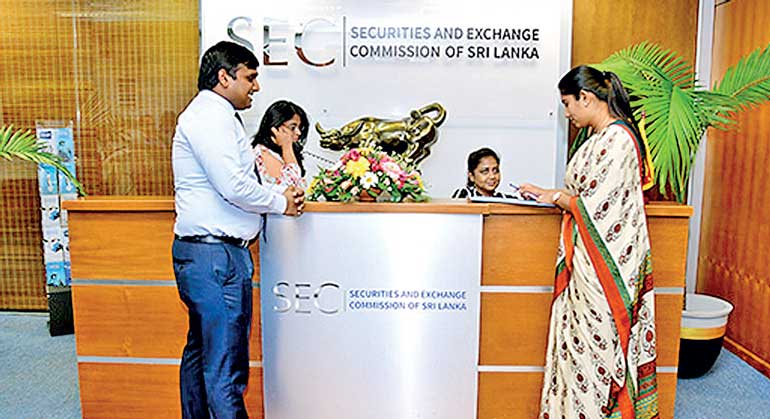Monday Feb 16, 2026
Monday Feb 16, 2026
Tuesday, 28 September 2021 02:57 - - {{hitsCtrl.values.hits}}

The Securities and Exchange Commission Act No.19 of 2021 (Act) came into force on 21 September 2021. This is the first consolidated Act since the original Securities and Exchange Commission Act No. 36 of 1987. There have been amending Acts in 1991, 2003 and 2009
Following is a synopsis of some of the changes introduced in the new Securities and Exchange Commission Act No. 19 of 2021:
Preamble
This synopsis is meant to serve as a guide to those who wish to gain a basic understanding of some of the more important changes introduced in the Securities and Exchange Act No.19 of 2021. It must not however be considered as a comprehensive and/or an authoritative statement of the law or its interpretation. Reference ought to be made to the Securities and Exchange Commission Act No.19 of 2021 for further clarifications of the exact legal position.
The Securities and Exchange Commission Act No.19 of 2021 (Act) came into force on 21 September 2021. This is the first consolidated Act since the original Securities and Exchange Commission Act No. 36 of 1987. There have been amending Acts in 1991, 2003 and 2009.
The shape of the legislation
A Market Institution has been defined in the Act as an exchange, clearing house or central depository.
The definition of a Market Intermediary is very wide and includes a stock broker, credit rating agency, a managing company, margin provider, underwriter to mention a few. It also includes a corporate finance advisor which among others includes persons who advise on fund raising requirements as provided for in the Act and adherence to listing rules of the exchange but it does not include an Accountant in practice or an Attorney at Law in practice.
Market Institutions and Market Intermediaries require to be licensed by the SEC.
The definition of a supplementary service provider in the Act is also very wide and includes a custodian, trustee, collective investment scheme, actuary, valuer or such other person who may be specified by the SEC who provides professional services to a market institution, listed company or a market intermediary or a collective investment scheme.
Supplementary service providers are not required to be licensed by the SEC but the SEC may request information and issue directives to supplementary service providers.
The detail
The references made are to the clauses of the new Securities and Exchange Commission Act No.19 of 2021.
1.Clause 30 – SEC may close securities market
The SEC may direct the Exchange to close the securities market for a period not exceeding five market days at a time if the SEC is of the opinion that a fair and orderly market for the for the trading of securities is being prevented or is likely to be the case.
2.Clause 31- Listing of an Exchange
The matters to be followed by an Exchange to seek a listing on its own Exchange are set out in this clause.
3.Clause 66 – 5% limit on voting rights in a Market Institution
No person other than a Government representative shall hold more than 5% of the voting rights of a Market Institution.
4.Clause 68 – SEC permission required for appointment of Directors, CEO / CRO of a Market Institution
The permission of the SEC is required for any person to accept an appointment as a Director or Chief Executive Officer or Chief Regulatory Officer of a Market Institution.
5.Clause 73 – Contents of Annual Report of a Market Institution
A Market Institution is required to include in the Annual Report a report on its corporate governance policy. A clearing house and a central depository shall include in the Annual Report an audited report on the risk management procedures and their application and such other information as may be required by the SEC.
6.Clause 75 – Risk Management Audit and SEC Audit of a Market Institution
A stock exchange, clearing house or central depository is required to perform a risk management audit as required by the SEC. The SEC shall perform an annual audit to ensure compliance with the provisions of the Act, Rules, Regulations and Directives issued by the SEC.
7.Clause 90 and Clause 108 – Duties of an Auditor of a Market Institution, a Listed Company and of a Market Intermediary
An auditor of a market institution, listed company and of a market intermediary is required to inform the SEC of any contravention or non-compliance of the SEC statute or rules and regulations made thereunder or the rules of the Exchange or of any irregularity or fraudulent or dishonest act or such other circumstances which may affect the financial standing of the company being audited. The SEC has the right to request for more information from the auditor following the audit.
8.Clause 112 – Market Intermediary or Registered Person is liable to compensate
A market intermediary or any person representing a market intermediary and registered with the SEC is liable to compensate a client for any loss or damage suffered by a client as result of a recommendation given by such market intermediary or person representing such market intermediary if there was no proper basis for making such recommendation. A recommendation must take into account the circumstances and the financial situation of the client.
9.Clauses 116 and 117 – Platform for trading Unlisted Securities
The new SEC Act provides for the establishment of a platform for the trading of unlisted securities by a market operator who is registered with the SEC.
10.Market Misconduct
Market misconduct has been categorised into Prohibited Conduct and Insider Trading.
The creation of a false or misleading appearance of the market is an offence and is known as false trading - (Clause128). The raising or lowering of the price or volume of a security in an artificial way is known as market manipulation and is an offence under the Act - (Clause 129). The publication of a statement or forecast by any person which he/she knows is false or misleading and is likely to have an impact on the price and value at which a security is traded is an offence under the Act - (Clause 130). Fraudulently inducing another person to trade in securities is also an offence under the Act – (Clause 131). These provisions are broadly known as Prohibited Conduct and were previously included in the SEC Rules 2001.
The provisions on Insider Trading remain but have now been improved upon – (Clauses 133 – 153).
11.Clause 147 – Punishment for Market Misconduct
A person who is convicted for market misconduct is liable to a fine of a minimum of Rupees Ten Million or to imprisonment for a term not exceeding ten years or both.
12.Clauses 18 and 149 – An Attorney at Law may represent SEC
The SEC Chairman may authorise any Attorney at Law who is serving on the SEC staff or otherwise to represent its interests in a Court of Law. Previously the SEC was represented only by the Attorney General. However all prosecutions for offences under the Act shall be instituted by the Attorney General.
13.Clause 151 – Civil Remedies for loss/damage
Any person who suffers loss or damage as a result of the conduct of another person who engages in market misconduct may institute legal action to recover such loss or damage whether or not such person has been charged for such offence or whether or not such contravention has been successful in a prosecution.
14.Clause 152 – Civil Remedies by SEC
Following consideration of the facts the SEC may institute civil proceedings against a person for engaging in market misconduct. As an alternative the SEC may enter into an agreement with the party to make a payment to the SEC of three times the amount of the gain or loss avoided with or without the admission of liability. An amount so recovered by the SEC shall be distributed equally in the following manner:
SEC to defray costs of the investigation and litigation
Compensation to persons who have suffered loss or damage as a result of the contravention
Credited to the Compensation Fund established under the Act
15.Clause 167 – Freezing Orders
If a person is being investigated for a contravention of a provision of the Act, rule, regulation or directive the SEC may issue a Freezing Order preventing the disposal of assets or entering into any transaction. Within seven market days of issuing the Freezing Order the SEC shall make an application to court seeking confirmation of such order and if need be an extension of the period of the order.
16.Clause 172 – Protection for Whistle blowers
An employer shall not punish or harass an employee in any way for providing information to the SEC on possible violations of the provisions of the Act.
17.Clause 178 – Administrative sanctions
The SEC may impose administrative sanctions for contravention of any provision of the Act, rules, regulations, directive or written notice except in the case of Market Misconduct. Such administrative sanction may take the form of a penalty not exceeding Rupees Fifty Million, reprimand, restitution and in the case of a Director or Promoter of a listed company a temporary prohibition of trading in securities.
(The writer, LLM FCMA, can be reached via [email protected]. He served the Colombo Stock Exchange from 1992 till 2001 for the most part as its Deputy General Manager and thereafter from 2002 to 2016 he served in several countries as an International Expert on Capital Market Regulation on assignments funded by various international donor agencies, national governments and other organisations. Copyrights reserved.)